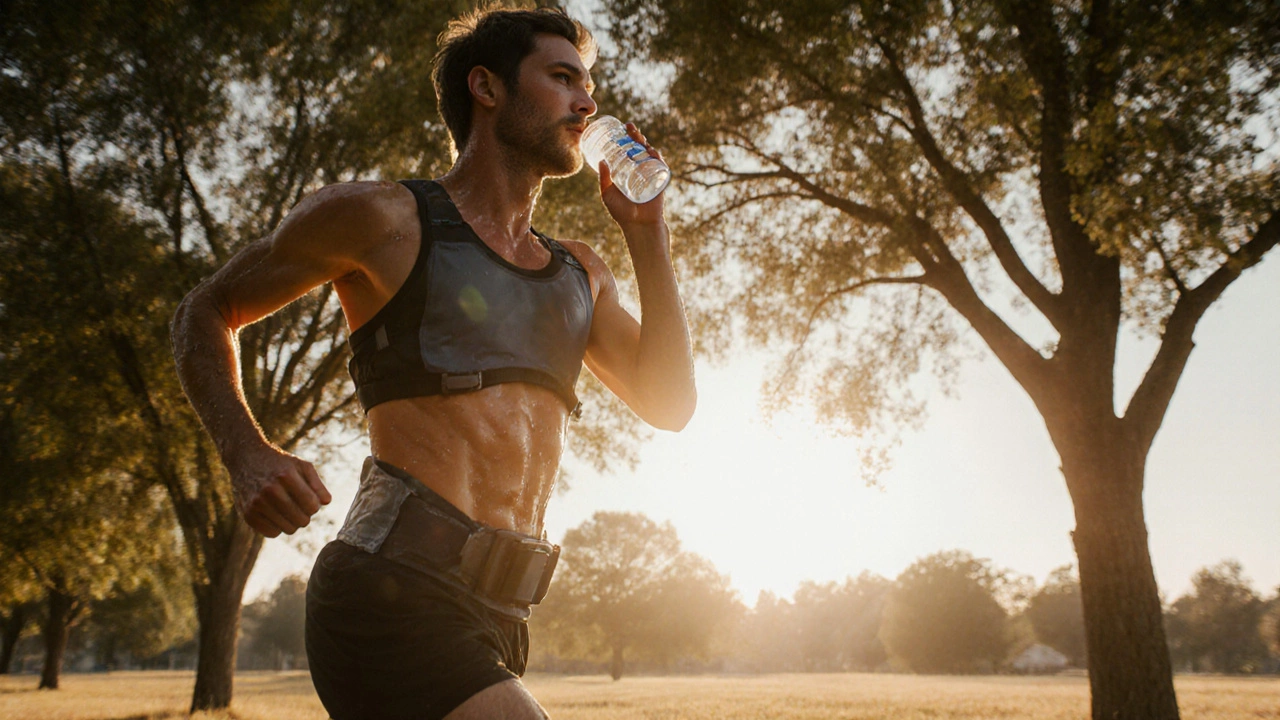
Based on your run duration, temperature, and weight loss to ensure you're properly hydrated without overdoing it.
Ever finished a run feeling like your mouth is full of cotton, your legs are heavy, and your head is spinning? You might’ve skipped a drink before you headed out-or thought, “I’ll just wait till I’m thirsty.” That’s a mistake. Drinking water while running isn’t optional. It’s the difference between finishing strong and collapsing at mile three.
Think of your body like a car engine. Run it without coolant, and it overheats. Same with you. Sweat isn’t just water-it’s salt, potassium, magnesium. Lose too much, and your muscles cramp. Your pace drops. You might even get dizzy.
Here’s what works:
Try this: Next time you run, carry a small bottle or use a hydration belt. Take a sip every time you pass a lamp post or tree. It’s not about gulping-it’s about keeping your fluid levels steady.
Here’s a real example: A runner in Perth does a 30-minute morning jog. She skips water because she thinks it’s too short. She feels fine… until day three, when she gets a headache and cramps in her calves. Turns out, she’d been running on low fluid for days. Her body had adapted to being dehydrated-and it was paying the price.

But if you’re running longer than an hour-especially in heat-you start losing sodium. That’s when you need electrolytes. A simple trick: Add a pinch of salt to your water. Or choose a low-sugar electrolyte tablet. Brands like Nuun or Liquid I.V. work well, but even a homemade mix of water, a dash of salt, and a splash of orange juice does the job.
Don’t fall for the hype. You don’t need a $5 sports drink for a 40-minute jog. But if you’re doing a 10K, half-marathon, or trail run in 30°C heat? Then yes-electrolytes matter.
Who’s at risk? Slow runners who drink too much at every water station. Marathoners who chug at every mile. If you’re running slower than 9 minutes per kilometer and drinking 500ml every 15 minutes? You’re in danger zone.
Rule of thumb: Drink when you’re thirsty, not because everyone else is. If you’re not sweating much and your urine is clear, you’re probably overdoing it.
Pro tip: Freeze your water bottle the night before. It stays cold longer and gives you a little extra cooling effect as it melts.

Runners in Perth’s winter often skip hydration because they don’t feel hot. Big mistake. One study in the British Journal of Sports Medicine found winter runners lost just as much fluid as summer runners-just slower. Drink the same way. Sip regularly. Don’t wait until you’re parched.
Example: You lose 0.8kg. That means you lost about 800ml of fluid. You should aim to drink around 600ml per hour during future runs to stay even.
Do this twice-once in summer, once in winter. You’ll see how your needs change with the season.
You just need to be consistent. Sip before. Sip during. Sip after. Listen to your body. Track your sweat. Adjust for heat and distance.
Running is about rhythm. So is hydration. Make it part of your routine-not an afterthought.
No, it’s not bad-it’s essential. Not drinking can lead to dehydration, cramps, fatigue, and poor performance. The key is to sip small amounts regularly, not chug large amounts all at once.
For most people, you don’t need to drink during a 5K unless it’s very hot. But you should drink 150-300ml of water 20-30 minutes before starting. If you’re running in 30°C+ heat, take a few sips halfway through.
Only if you’re running longer than 60 minutes or in hot conditions. For shorter runs, plain water is enough. Electrolytes help replace sodium lost through sweat, which matters for endurance, not quick sprints.
Yes. Drinking excessive amounts-especially plain water-can cause hyponatremia, a condition where blood sodium drops too low. Symptoms include nausea, confusion, and swelling. Slow runners who drink too much at every water station are most at risk. Listen to your thirst, not the crowd.
Check your urine. Dark yellow or amber means you’re dehydrated. Light straw color is good. Other signs: dry mouth, headache, dizziness, or feeling unusually tired. Weighing yourself before and after a run is the most accurate method-every kilogram lost equals about 1 liter of fluid needed.